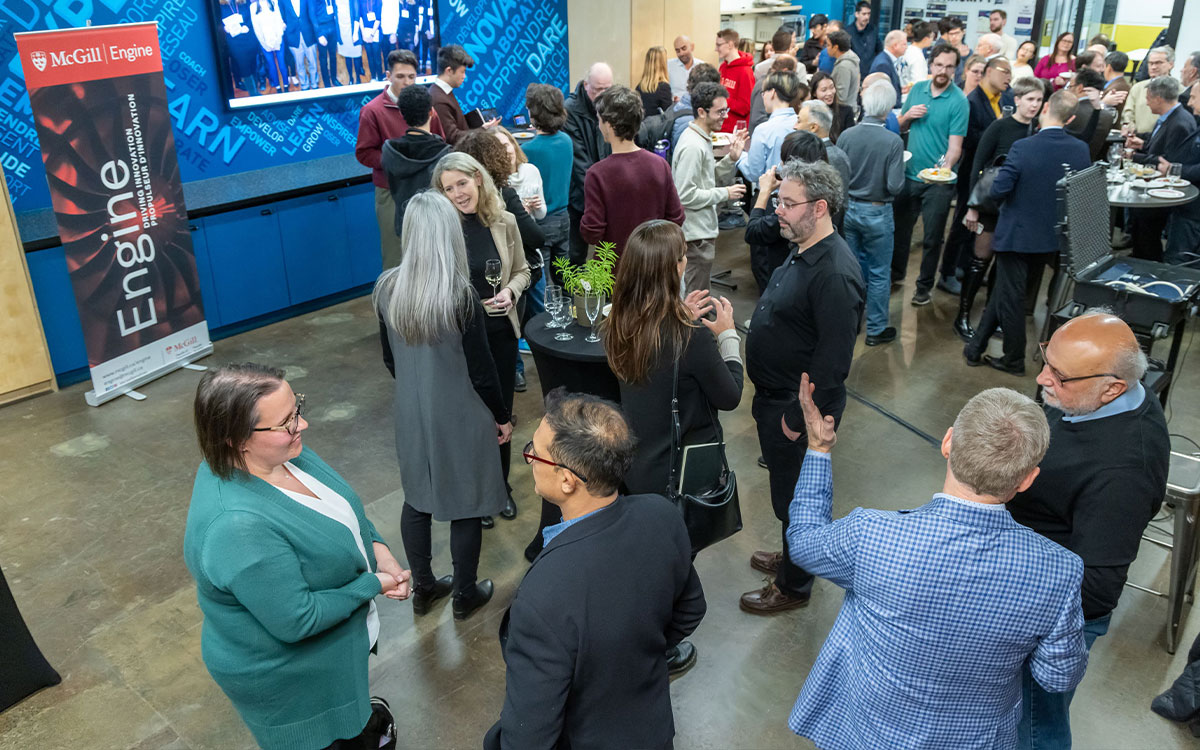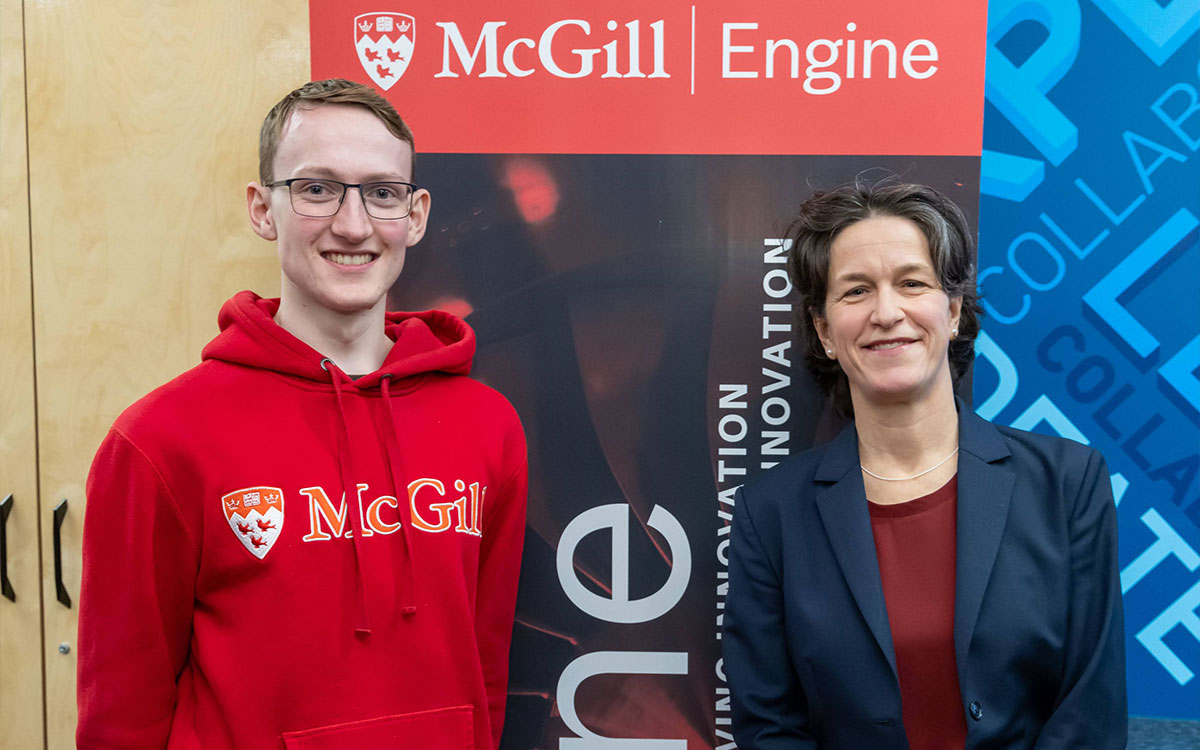At the Faculty of Engineering’s 2023 Annual Celebration of Innovation and Entrepreneurship, Katya Marc rhymed off a flurry of statistics about the McGill Engine Centre’s impressive impact.
In a nutshell? Engine has trained, mentored, advised, and financially encouraged a lot of McGill students and researchers since its inception a decade ago.
The Centre was established thanks to a major gift from the late William Seath, a McGill Engineering graduate. It supports technologically-based innovation and entrepreneurship across McGill and helps accelerate the commercialization of McGill inventions and software. It also contributes to the innovation ecosystem beyond the Roddick Gates in Montreal and Quebec.
“The vision is about driving innovation by supporting and training our professors and students and working closely with industry for R&D,” explains Marc, Engine’s associate director who co-founded the Centre and its programs along with its director Professor Benoit Boulet. “For us, innovation is really a process, and you have to go all the way to implementation to create value for society to achieve an innovation, otherwise it remains an invention or an idea. Our students learn and develop their entrepreneurial skills by going through this process of innovation.”
The McGill engineering community gathered last November to honour Engine’s 2023 award winners and celebrate the thriving incubator’s 10th anniversary.
Forty-seven startups – about half launched by undergraduate students and the rest by McGill graduate students and professors – have emerged from the Faculty of Engineering since Engine’s launch in 2013, including CarbiCrete, Ora Graphene, Taiga Motors, and Bluecity.ai. Many of them have been supported in some way by Engine, from grants to strategic guidance and mentoring.
“It’s amazing to see how the Centre has grown over time,” Viviane Yargeau, Dean of the Faculty of Engineering, told the gathering. A Chemical Engineering professor who has also benefitted from the support that Engine provides to researchers, Yargeau recalled the excitement in 2019 when Engine’s physical centre was built in the Frank Dawson Adams Building. “It really facilitates collaborations and collisions between the different stakeholders,” she said.

Engine has distributed more than $1.5 million in funding to date to over 260 McGill projects and startups in grants, prizes, stipends, and awards. The Centre’s training and experiential learning programs include teaching students and faculty the entrepreneurial mindset: being curious, making connections, and creating value. “Which doesn't mean you will necessarily create a startup, but you’ll be a better employee, a better engineer, a better scientist – an innovator, really,” Marc says.
At Engine’s recent celebration, one of the honourees was PreFab AI Photonics, a venture by Professor Odile Liboiron-Ladouceur in the Department of Electrical and Computer Engineering and McGill postdoctoral researcher Dusan Gostimirovic.
PreFab AI Photonics won a William and Rhea Seath Award in Engineering Innovation, the inaugural Chwang-Seto Innovation Fellowship, and an NSERC Idea to Innovation grant for its software-based tool to enable hardware development.
As PreFab notes in its executive summary, the semiconductor industry can now integrate light on a computer chip, resulting in higher data capacity in communications. However, light “is more susceptible to fabrication process deviations than its electronic counterpart. Our invention uses machine learning to predict and correct deviations in the design of photonic (optical) integrated circuits prior to nanofabrication, saving on cost, time, and energy.”
Liboiron-Ladouceur began collaborating with the National Research Council (NRC) in 2020, studying how to use AI in photonic designs. Gostimirovic joined the project a year later and proposed training an AI model to predict and correct for design deviations. “I thought that was very clever and we pushed in that direction,” says Liboiron-Ladouceur, who holds seven granted patents and worked in the U.S. semiconductor industry before making the leap to academia.
“I truly believe that it can change how things will be done in the field of photonic integrated circuits,” she says.
The NRC is a co-inventor of the patent-pending technology related to PreFab AI Photonics but isn’t involved in the venture.
PreFab spent much of last year on market research, business development and transitioning their technology into more of a product. “It’s not quite fully there yet. There’s still some work to be done,” says Gostimirovic. “But 2024 is going to be our big push going forward, transitioning fully from in the lab into commercialization.”
“We’re seeing quite a bit of interest and excitement externally and that just kind of fuels us to go forward,” Gostimirovic adds.
He and Liboiron-Ladouceur also took part last year in programs offered by Engine and appreciate the valuable support and guidance. The funding has allowed them to hire undergrad students to help them with software development, acquire two high-performance workstations, and travel to international tech conferences to network. They continue to benefit from weekly meetings with Derrick Wong, an engineer, course lecturer at McGill, and one of Engine’s Ronald Chwang Entrepreneurs-in-Residence.

“He's able to give us a balanced opinion based on his experience and different angles for a given situation,” says Liboiron-Ladouceur.
From the get-go, beginning with William Seath’s foundational gift, alumni, donors, and volunteers have been integral to Engine’s success as an early-stage incubator.
“We couldn’t do it without them,” says Marc. “Their support has been so vital in getting us started, when we were a new venture ourselves, and alumni, donors, and volunteers continue to help us by sharing their time, expertise, and invaluable guidance with our students and Faculty in building their entrepreneurial mindset.
This article was originally published on the McGill Giving site.
